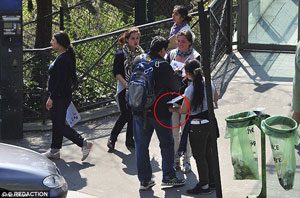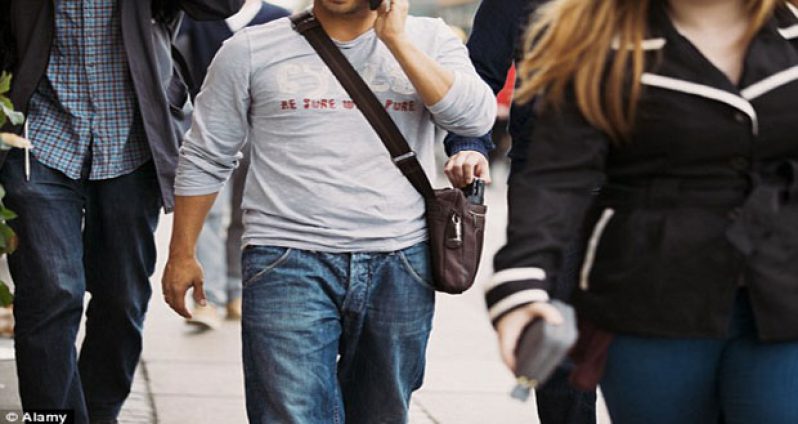WHEN travellers go on holiday, all they see are the exciting attractions and the prospect of exploring a new city. All pickpockets see when these tourists arrive, however, is a gold mine just waiting to be exploited.
But professional con artists do work in predictable ways, and, with a few tips, you can understand how and where they operate, avoid areas where you are most vulnerable, and hopefully hold on to your valuables.
WHAT THEY DO
The methods thieves use to plunder valuables are varied and constantly evolving.
In a bid to crackdown on crime, the British Transport Police revealed the most common techniques pickpockets use, which includes the ‘concealed hand’, the ‘helpful stranger’ and ‘the stall.’
Thieves operating in pairs work by one member stalling the target, like by getting stuck at the underground ticket barrier for example.
The other member will take advantage of the victim being stalled, and quickly smuggle their valuables away.

When taking possession, thieves will often cover their hands with a newspaper or coat, so others are not aware of their movements.
Sometimes a stranger will offer to help you out the blue by brushing something off your coat, or helping you with directions. And while you are caught off-guard, this is the perfect opportunity for someone else to take your belongings.
WHERE THEY STRIKE
The biggest feat a pickpocket must overcome is entering the personal space of an individual.
This is not easy, as people tend to be on their guard if they are in a new environment and out in public.
Crowded places such as busy attractions are the perfect places for overcoming this personal barrier.
Professional pickpocket and entertainer, James Freedman, who has been consulted for his expertise by the Metropolitan Police, said high tourist attractions where people are looking up are popular, such as Big Ben and the Eiffel Tower.
Ironically, places which have signs warning of pickpockets are common hunting grounds too, as people will instinctively check their pockets, which alerts thieves to exactly where their valuables are located.
HOW TO BEAT THE PICKPOCKETS
1: Place your wallet in your front pocket instead of the back. Using an elastic band around the wallet will prevent it from smoothly sliding out your pocket as well.
Consider taking a dummy wallet with you, as most thieves will not look for another, once they have found the first one. This can also work with a dummy old phone.
2: Spread your valuables instead of keeping them in one place.
If you are unlucky enough to be a victim of pickpocketing, and your ID, passport, cards and important documents are spread out, you will not lose everything in one go.
3: Do not accept food or drink from strangers who you’ve just met in hotels or on buses or trains.
4: Before travelling, research whether the destination is notorious for any particular scams. Embassy websites and Online travel forums are particularly good sources.
5: Carry a backup ATM or credit card in case you lose your main card.
6: Females should consider sewing a pocket into their bras for valuables, as thieves are well aware of money belts, and know how to target them.

7: When sitting down, keep your bag looped through your leg, or under a chair leg to avoid someone making off with the whole bag.
8: Consider purchasing a slash-free bag to avoid pickpockets cutting into your belongings to extract valuables.
9: Don’t draw attention to your belongings by letting pickpockets know where you are keeping each valuable.
10: Remain aware; pickpockets succeed by successfully misdirecting your attention; so be suspicious if someone tries to distract you during your day.
OTHER SCAMS TO BE AWARE OF
1: Fake wake-up call
According to Cheapflights.co.uk, one of the most popular travel scams is when guests are woken up by someone claiming to be from the front desk.
The person on the phone will often claim the internal computer system has crashed, and they require your credit card information again.
Sleep-addled guests have been known to provide their bank details, resulting in the scammer draining their accounts.
The scam has been known in places such as Georgia, US.
HOW TO AVOID IT: Never give out bank details or any information over the phone and notify hotel staff and police immediately.
2: Injured beggars
Peter John, author of Around the World in 80 Scams: An Essential Travel Guide, warned in his book that many beggars fake injuries to get greater donations.
“Gangs of panhandlers prey on travellers’ generosity,” wrote Peter.
“This is especially common in India, South America and south east Asia.”
Sometimes the injuries are real, with some horrific stories behind how they were received.
In 2008, Pakistani police arrested a begging gang. An eight-year-old boy told them that one of the gang masters had broken his arm.
In such gangs, begging children would be forced to collect money, and then hand it over to gang masters, who would keep them alive in return for the cash.
HOW TO AVOID IT: Instead of giving money, why not give the children food as a donation.
3: Airport security
Be aware in the airport of people stealing your valuables as you go through airport security.
Once you have placed your laptop, phone and wallet on the conveyor belt, someone will dash through in front of you with keys in their pocket.
During the delay, your belongings will have gone through the X-ray machine, and will be quickly taken by an accomplice on the other side.
The Kenyan police posted warnings about this scam on their website, and the US Federal Aviation Administration also mentions it.

HOW TO AVOID IT: Keep your belongings with you until just before you walk through security, and keep an eye on them after they are processed by the machine.
4: Phony take-away menu
No matter how hungry you are or late it is, watch out for fake menus. Once you’ve settled into your hotel room, a takeaway menu might be slipped under your door.
If you order from it, there’s a strong chance you won’t see any food but the person on the other end of the phone now has your card details and will be making a large withdrawal.
HOW TO AVOID IT: Eat in local restaurants, or order from room service.
5: Corrupt policemen
“Policemen pretend that tourists have broken the law and demand thinly-disguised bribes,” says Peter. “Unfortunately, this can happen anywhere with badly paid and corrupt cops.”
It happened to him in northern Mexico. On the way to the American border a policemen stopped them and engaged in conversation.
He spotted a pocket penknife and demanded what he called a ‘quick fine’ of $30 (£19). The fine was negotiated to $10 (£6.50) and the penknife was confiscated.
There are thousands of stories like this, but, unfortunately, there’s little you can do to prevent it, save staying at home.
HOW TO AVOID IT: Being amenable, keeping your temper and try to talk your way out or around the situation.
6: Airline ticket refund ruse
It is important to beware of cheap tickets and refundable schemes.
“Scammers advertise refundable airline tickets free on sites like gumtree.com,” says Peter John.
“They sell them for cash (to you), and then get the money they paid for the tickets refunded to their credit cards.”
The result is that you end up with no ticket, and an airfare down; the scammer has your money as well as the cash they originally paid for the ticket refunded.
HOW TO AVOID IT: Buy tickets directly from airlines or first-hand through trusted websites.
7: Rosemary or bracelet seller
Beware the lovely woman offering you a sprig of rosemary, or a bracelet which can symbolise good luck or friendship.
Next thing you know, she will be holding your hand and reading your fortune.
Once you accept the goods, or allow her to begin the fortune-telling spiel, she’ll demand money in return; more and more loudly, until you are embarrassed into paying and fleeing.
Watch out in Madrid and New Delhi for this.
HOW TO AVOID IT: Walk swiftly in the opposite direction and do not show an interest in the products.
By Becky Pemberton For Mailonline




.png)









